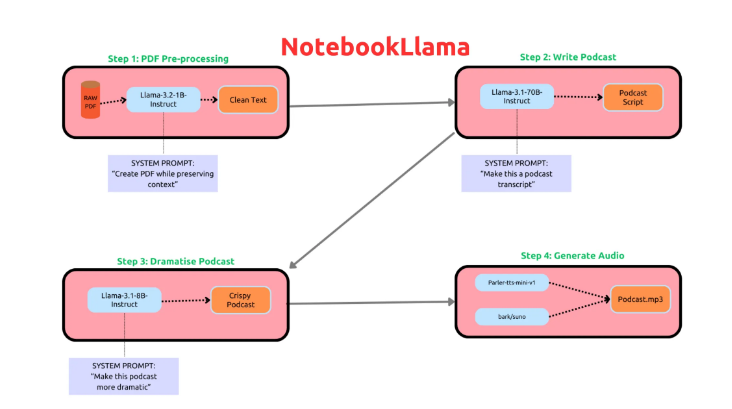Meta recently released a project called NotebookLlama, an impressive AI tool that generates podcast-style summaries from uploaded text files. Similar to Google's NotebookLM, NotebookLlama uses Meta's own Llama model to convert text files into podcast-style audio content. The editor of Downcodes will give you an in-depth understanding of the characteristics and limitations of this project, as well as its impact in the field of artificial intelligence.
Meta recently released a project called NotebookLlama that generates podcast-style summaries, similar to Google's NotebookLM. The project uses Meta's own Llama model for processing, which can generate podcast-style summaries from uploaded text files.
First, NotebookLlama creates a transcript from a file, such as a PDF of a news article or blog post. It then adds "more drama" and interruptions before feeding the transcript into an open text-to-speech model. While the results don't sound as good as NotebookLM, Meta's researchers say the quality can be improved with more powerful models.

“Text-to-speech models limit how natural they sound,” they write on NotebookLlama’s GitHub page. “[Also] another way to write a podcast is to have two agents discuss a topic of interest and write a podcast outline . Currently we use a single model to write podcast outlines.”
While NotebookLlama isn't the first attempt to replicate NotebookLM's podcasting capabilities, it's still a project worth keeping an eye on. However, all AI-generated podcasts have a common problem: the problem of illusion, that is, AI-generated podcasts must contain some fictitious content.
All in all, although NotebookLlama still has room for improvement in audio quality, its innovative idea of trying to use AI to generate podcast summaries deserves recognition. In the future, as models improve and technology advances, I believe projects like NotebookLlama will play a greater role in the field of podcast production and bring new possibilities to content creation. However, how to effectively solve the problem of AI-generated hallucinations is still a challenge that needs continued attention and overcoming in this field. The editor of Downcodes will continue to pay attention to the subsequent development of this project.